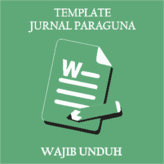PENELUSURAN LIRIK ISLAMI LAGU KAWIH SUNDA 'KUDU KASAHA' KARYA WINARYA ARTADINATA
DOI:
https://doi.org/10.26742/jp.v2i1.1859Keywords:
art, faith, Islamic, morals, religion.Abstract
'Kudu Kasaha' is the song title or rumpaka written by Winarya Artadinata. The theme of the lyrics conveys a mindset based on religious ideology, Islam. It's the result of the resignation facing complaints, fluctuation and uncertainty offaith. If it is listened deeply, the lyrics reminds the listeners to submit the complaints and uncertainties of faith in God Almighty. Moreover, the choice ofwords is composed in the literary mindset. The lyric of 'Kdu Kasaha', thus, isthe morals of religion and art.
References
AL Barry, M. Dahlan
Kamus Ilmiah Populer. Surabaya: Penerbit Arkola.
Arsyad, M. Natsir
Seputar Rkun Iman& Rkun Islam. Bandung: Penerbit Al•
Bayan.
Atmazaki
Analisis Sajak, Teori, Metodologi dan Aplikasi. Bandung:
Penerbit Angkasa.
Gazalba, Sidi
Pandangan IslamTentang Kesenian. Jakarta: Penerbit Bulan
Bintang.
Koko, Mang
t.t. Kumpulan Kawih Sunda (Bahan Kuliah Mata Kuliah Vokal) Tulisan Pribadi.
Lull, James
Media, Komunikasi, Kebudayaan. Jakarta: Yayasan Obor
Indonesia.
M. Royan, Frans
MarketingSelebrities. Jakarta: PT. Gramedia.
Mustappa, Abdullah
Wirahma Sajak, Panganteur Aprcsiasi Sajak Sunda.
Bandung: Penerbit Medal.
Purba, Antilan
Kompasiana (duinduh tgl. 4 Juli 2015 pkl. 12.53).
Downloads
Published
Issue
Section
Citation Check
License
- Authors retain copyright and grant the journal right of first publication with the work simultaneously licensed under a Creative Commons Attribution License that allows others to share the work with an acknowledgement of the work's authorship and initial publication in this journal. Authors are able to enter into separate, additional contractual arrangements for the non-exclusive distribution of the journal's published version of the work (e.g., post it to an institutional repository or publish it in a book), with an acknowledgement of its initial publication in this journal. Authors are permitted and encouraged to post their work online (e.g., in institutional repositories or on their website) prior to and during the submission process, as it can lead to productive exchanges, as well as earlier and greater citation of published work.









